In 1979 more than 50 per cent of the electorate voted in favour, but a technical condition imposed on the vote by Westminster meant the simple majority was not enough. It is a sign of how far Scotland has travelled since then that such political manipulation is now inconceivable without a decisive backlash against the union.
During that that great constitutional upheaval in 1979, the Scottish people had no choice – they had to depend on the traditional media. But we now live in a different world. Newspapers are suffering everywhere as audiences fracture and turn to niche publications or free source of ‘authoritative’ news.
But there are big differences in Scotland. The Scottish-based papers are caught in a vice. On one hand they haemorrhaging readers to online sources, while on the other hand, the UK national titles like the Sun and Daily Mail are using Scottish editions to grab Scottish readers.
The Herald and Scotsman – both formidable heavyweights in their day – now have print circulations of just 40,000 and 30,000 respectively. The last full-year figures show the Scotsman’s print sales fell by 17 per cent. The Press and Journal (the biggest Scottish-owned regional) has fared better but even it saw its circulation fall by 5 per cent.
The Daily Record has seen its share of the market shrink by 10 per cent year on year. It is still grinding its axe after the SNP’s landslide in the last Scottish Parliament election – it runs a permanent campaign in support of Scottish Labour.
The fact that none of the mainstream papers have managed to build a really commanding online presence is more evidence that the traditional media in Scotland is in trouble.
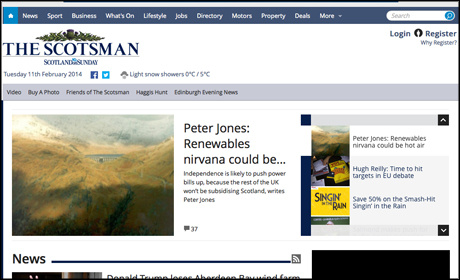
Scotsman.com has come closest, but one glance at the site and you can see it is maybe five to 10 years behind leading news sites elsewhere. Compare it to the beautiful walesonline.com and you get the idea. The Herald is hidden behind a Times-style pay-wall.
Overwhelmingly, the Scottish press response to the new market is to shift its print content online, offer clumsy comment plug-ins, and hope for the best. The Scottish papers may not be the only ones guilty of this approach.
But perhaps the industry model of a traditional press owned and controlled outside Scotland by international media empires doesn’t give these sites the lightness of foot they need to adapt to what is a much tougher market than elsewhere.
The industry may have stumbled along like this for years to come. But the 2014 Referendum has detonated change in the Scottish media and, in turn, Scotland’s new media is having an impact on the referendum.
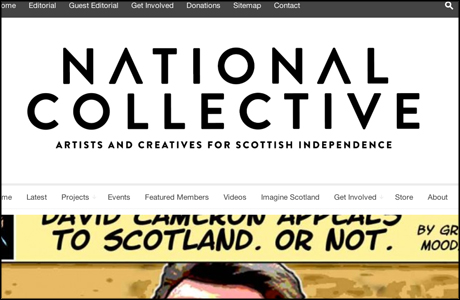
From almost nowhere, nationalcollective.com has blossomed into a slick and imaginative cauldron of debate. Born in 2011 among artists and writers it is now embarking on a mission to "inspire a tidal-wave of change, confidence and creativity across Scotland". Refreshingly, the project has steered clear of the tired ‘news’, ‘features,’ ‘opinion’ menu of content and tapped into its membership to exploit the potential of a wired artistic community. Its fusion of the visual and the written, the high-brow, the anecdote, the play and the first-person, is a feast for anyone interested in politics and the arts in Scotland.
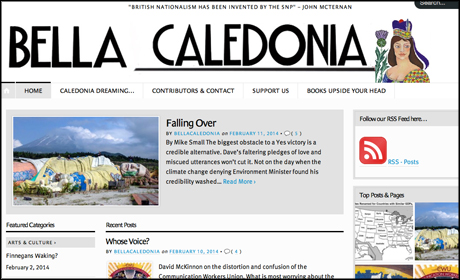
Bellacaledonia.org.uk is just as impressive. Edited by Mike Small, the magazine-style site has a list of contributors who are at the cutting-edge of debate or the new media revolution in Scotland or both.
Newsnetscotland.com now adds some desperately needed diversity to the ‘same-old’ angles repeated in the mainstream. For a sizeable number of people in the Yes camp, it is gradually becoming their default destination for news. The site now boasts journalist and writer Lesley Riddoch as a regular columnist and two full-time freelance journalists.
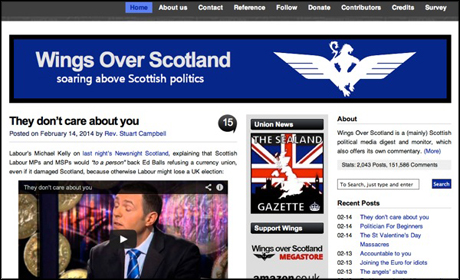
And then there is Wings Over Scotland. Speak to anyone engaged in the referendum debate and they will know all about it. It attracts just as much praise and respect from those in the Yes camp as it draws vitriol and abuse from the No side. With almost the whole of the UK’s traditional media lined up against Yes, Wings Over Scotland is a refreshing antidote. It is irreverent, brave, challenging, intelligent and often carries brilliant analysis and debunking of the media’s campaign against the Yes movement. The fact that a serious and on-going targeted DoS attack has been launched against the site is proof it is making an impact.
But while the emergence of these sites is interesting, their growth makes them pivotal players in the referendum campaign. Wings has quadrupled its readership in just one year. Taken together, they now reach more than 500,000 unique visitors per month. Scotsman.com is seeing that kind of audience each week but, given the trajectory of the numbers, those four new-generation sites may soon have a combined readership that will match the most-visited of the mainstream.
It is as if Scotland has uncorked its journalistic creativity and more voices are adding to the diversity. Wealthy Nation is a pro-independence web-based think-tank but it is also pro-market and right-of-centre.
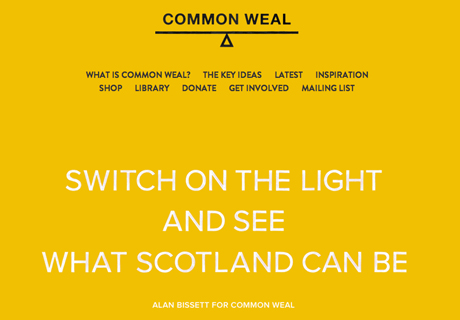
If you are looking for utterly inspirational minimalist web design then look no further than the Reid Foundation’s Common Weal project. Common Weal is a Scots term meaning 'wealth shared in common' and its stated aim is "to develop a vision for economic and social development in Scotland which is distinct and different from the political orthodoxy that dominates politics and economics in London".
5 Million Questions is a University of Dundee project that aims to give the public access to a knowledge exchange on the referendum debate. The Skinny is Scotland’s independent cultural journalism site, launched after the success of the hard copy which became Scotland’s largest listings magazine. It now has 18 staff and has launched an edition in north-west England. There is also A Thousand Flowers with its very different take on current affairs: "Politics is made deliberately dull and difficult to make sure most people don't get a say and we think that needs to change".
Those sites - and many others - are transforming the Scottish media landscape. And if you think the selection is skewed to sites that are either neutral or pro-independence then you’d be right. The official Conservative and Labour funded Better Together message has failed to spark a grass-roots campaign. The case for the Union made by creative citizen journalists – doesn’t exist. Ironically, one of the liveliest Labour blogs in Scotland is now – Labour for Independence.
The Yes movement may not win the referendum. Many predict that Westminster will have an armoury of tricks to deploy in the coming months. Recent history has shown that UK ministers are not shy of deliberately withholding key data from the Scottish public and whispers in dark corridors of the state will be used to leverage support for the Union from the influential.
It is up to journalists to reveal that data and shine a light in those corridors. Equally, the Scottish Government should be cross-examined about the claims it makes in its White Paper. If Scotland is to embark on the independence journey, then it is up to journalists to help draw the map and highlight the hazards. Scotland’s new media is already making a vital contribution in both of those roles.
No matter what the eventual result, one thing is definite; Scotland’s media landscape has changed utterly. The dark days of a media caged in by the BBC and a few dominant papers owned and controlled outside Scotland are over.
This is the second half of a two-part comment piece by Colin Meek. The first half asked: 'Is traditional journalism broken in Scotland?'
 Colin Meek is a freelance journalist, media trainer and research consultant based in Scotland. He is also consulting editor to Journalism.co.uk where he was founding editor of the site's news channel - dot.journalism.
Colin Meek is a freelance journalist, media trainer and research consultant based in Scotland. He is also consulting editor to Journalism.co.uk where he was founding editor of the site's news channel - dot.journalism.
Free daily newsletter
If you like our news and feature articles, you can sign up to receive our free daily (Mon-Fri) email newsletter (mobile friendly).
Related articles
- What mainstream media can learn from niche news sites
- New Scottish collaborative publication launched to "lessen the load" on independent titles
- Catherine Salmond, editor at The Herald, on empowering women in the newsroom
- New policing and crime publication launches in Scotland
- German publishers are concerned the EU's ePrivacy Regulation is putting their digital advertising revenue at risk, study finds









